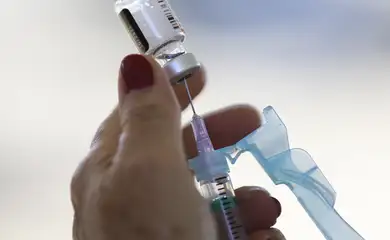End of the pandemic still hard to predict, specialists argue

The peak of the Omicron variant led to a record number of COVID-19 cases worldwide back in early 2022, and the ensuing decline in Brazil should bring what Oswaldo Cruz Foundation (Fiocruz) terms a window of opportunity for controlling the now two-year-old pandemic.

“After a large number of people have become immune to the disease, if complete vaccination has wide coverage, we could slash cases, hospitalizations, and deaths, as well as block the circulation of the virus,” Fiocruz’s COVID-19 Observatory report from early February stated, while predicting the drop in cases confirmed in recent weeks.
A more favorable landscape in the future, however, does not mean the end of the pandemic, observatory researcher Raphael Guimarães points out. “We believe Brazil is likely to enter a more optimistic phase,” he argued. “We’ve seen a reduction in new cases, a gradual decompression of the health system, lower bed occupancy rates, and we should soon see a reduction in deaths.”
A golden chance
To seize this promising opportunity, Guimarães argues the country needs to advance its vaccination drive and redress coverage inequalities across states and municipalities, as sometimes even the rates in neighboring cities can be disparate.
“What we need to take into account is that every public policy must be based on the principle of minimizing inequalities on every geographical scale. We need a coordinated federal policy to reduce inequalities between states. The states need to follow along and reduce the inequality between municipalities, and the municipalities should work locally on their districts. And all this must be implemented in a coordinated fashion.”
In the view of Alberto Chebabo, head of the Brazilian Society of Infectology, it is still hard to say for certain whether the drop in cases—brought about by vaccine immunity coupled with the antibodies acquired by people recently infected with Omicron—will be enough to indicate the end of the pandemic.
“You can't tell when the end of the pandemic will be, what you can do is look back and tell when the end of the pandemic was,” he noted. “If no new variants of concern show up, we should have a calmer period, with fewer cases and deaths. However, we were at a moment like this in November last year after the end of Delta, and then Omicron appeared, so making predictions can be difficult.”
Pandemic or endemic?
Last week on Twitter, President Jair Bolsonaro wrote the Ministry of Health has been considering downgrading the status of COVID-19 in Brazil to endemic—after which the disease would be regarded as part of everyday life, along with other diseases monitored by health agencies. In a note released the same day, the ministry confirmed it has taken steps in this direction.
Chebabo points out that the pandemic is a major international concern, with a considerable impact across all continents, which is why it was declared as such by the World Health Organization. “The end of the pandemic is not to be defined by any country, but the WHO itself, the authority that declared the pandemic status,” he says. “A country can declare the end of the state of emergency, remove restrictive measures, suspend the use of masks, but the authority that declares the end of the pandemic is the WHO, based on figures monitored across the world,” he added.
Contacted by Agência Brasil, the Ministry of Health stated it is “assessing the measure regarding the endemic status, alongside other ministries and relevant agencies, taking into account the epidemiological scenario and the behavior of the virus in the country.”
Booster doses
Flávia Bravo, director of the Brazilian Immunization Society, notes that the stabilization of the epidemiological data will play an important role in ascertaining how vaccination with booster doses against COVID-19 will be conducted, and whether it will be really necessary for everyone.
“There are several points we have to discuss, not just whether it will be necessary or not. Maybe only some will need it. We may reach the conclusion that immunosuppressed patients, who show a poorer and shorter response, will need booster doses to raise their antibodies. We may come to the conclusion that even healthy people need it. It also depends on the circulation of the virus,” he added. “How long protection lasts can be easy to observe if no new variants appear. We’ll keep monitoring cases. That’s what science does—not just for COVID but for all diseases,” he declared.






